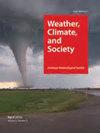Climate Change Driving Salinity an Overview of Vulnerabilities, Adaptations, and Challenges for Indonesian Agriculture
IF 1.9
4区 地球科学
Q3 ENVIRONMENTAL STUDIES
引用次数: 0
Abstract
Abstract Climate change has negatively affected agricultural productivity in Indonesia. This study aimed to conduct a bibliometric analysis of the literature on soil salinity caused by climate change, discuss the impact of soil salinity on Indonesian agriculture, examine various strategies for adaptation to salinity, and deliver some ideas for future research. An analysis of 39 identified Scopus articles related to farmers' vulnerability, adaptation, and practices was carried out. This study was performed in November 2022 and employed Bibliometrix R-package and VOSviewer software. Findings show that salinity has left Indonesia's agriculture vulnerable to reduced food production, especially for small-scale farmers losing crop yields and land. Various adaptation measures have been initiated, such as restoring soil fertility and using saline-resistant varieties. Irrigation facilities improvements have also been carried out to reduce the risks of soil salinity expansion. Farmers also try social action measures, such as selling assets, borrowing money for daily needs, and even changing jobs. However, farmers to survive and sustain their businesses, any any such measures need to produce satisfactory results. A review of the existing literature reveals a lack of soil salinity studies in Indonesia which simultaneously points to research gaps not only on the issue of the impact of salinity on income and the vulnerability of small farmers but also on the development of adaptation strategies to address salinity due to climate change.气候变化驱动盐度:印尼农业脆弱性、适应性和挑战概述
气候变化对印度尼西亚的农业生产力产生了负面影响。本研究旨在对气候变化引起的土壤盐化的文献进行文献计量分析,讨论土壤盐化对印尼农业的影响,研究适应盐化的各种策略,并为未来的研究提供一些思路。对Scopus中39篇与农民脆弱性、适应性和实践相关的文章进行了分析。本研究于2022年11月进行,采用Bibliometrix R-package和VOSviewer软件。研究结果表明,盐碱化使印度尼西亚的农业容易受到粮食减产的影响,特别是小农的作物产量和土地损失。各种适应措施已经启动,如恢复土壤肥力和使用耐盐碱品种。灌溉设施也得到改善,以减少土壤盐碱度扩大的风险。农民还尝试社会行动措施,如出售资产,借钱满足日常需求,甚至换工作。然而,农民为了生存和维持他们的生意,任何这样的措施都需要产生令人满意的结果。对现有文献的回顾表明,印度尼西亚缺乏土壤盐度研究,这同时指出了研究空白,不仅在盐度对收入和小农脆弱性的影响问题上,而且在制定适应战略以应对气候变化导致的盐度问题上。
本文章由计算机程序翻译,如有差异,请以英文原文为准。
求助全文
约1分钟内获得全文
求助全文
来源期刊

Weather Climate and Society
METEOROLOGY & ATMOSPHERIC SCIENCES-
CiteScore
3.40
自引率
13.60%
发文量
95
审稿时长
>12 weeks
期刊介绍:
Weather, Climate, and Society (WCAS) publishes research that encompasses economics, policy analysis, political science, history, and institutional, social, and behavioral scholarship relating to weather and climate, including climate change. Contributions must include original social science research, evidence-based analysis, and relevance to the interactions of weather and climate with society.
 求助内容:
求助内容: 应助结果提醒方式:
应助结果提醒方式:


